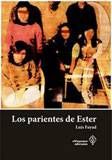New Spanish Books: The online guide of titles from Spanish publishers and literary agents with rights for translation in the UK. To consult titles available in other markets please click on the above links.
Los parientes de Ester

In Los parientes de Ester, Luis Fayad enters the social fabric of Bogota in the late sixties and early seventies to tell the decline of a family that clings to tradition.
The novel begins with the death of Esther, wife of Gregorio Camero who was widowed with three children. After that a collective story develops in which we discover the misfortunes of all the relatives, their frustrations, their failures and values.
As the plot progresses, the characters’ luck seems less personal and more social. Unemployment, retirement, poor wages, even if not misfortunes of their own, end up ruining their innermost parts. This novel seems to reveal that a miserable life is not only due to chance, accident or unavoidable destiny, but also to the mismanagement of government, to social abulia to modify the conditions of existence, as well as to the excesses of corruption and violence which impose a society of tricks, deception, and fraud.
Gregorio Vamero, Ángel and Amador Callejas are just like men in any city, later than early, they begin to realize that the "society" in which they live is not the best. At the end of the novel -as in real life- they end up feeling that their own misfortunes are no longer so personal, but imposed by a society which is hard to knock down: that of deception.
